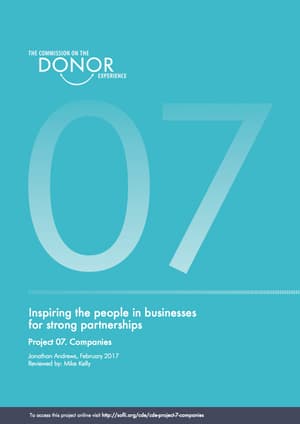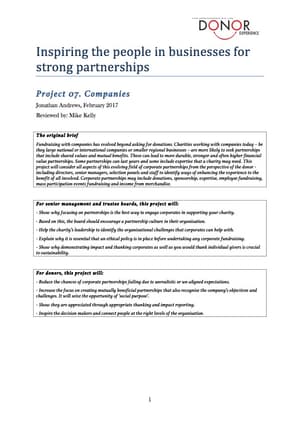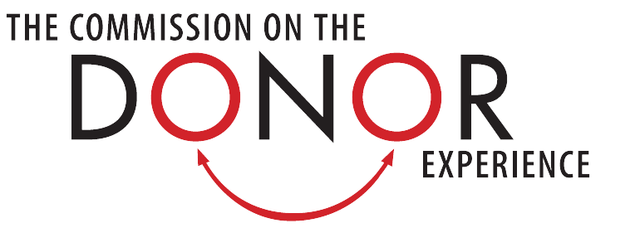CDE project 7 summary: companies
- Written by
- The Commission on the Donor Experience
- Added
- May 01, 2017
Inspiring the people in businesses for strong partnerships
Jonathan Andrews, February 2017
Reviewed by: Mike Kelly



Summary
Corporate partnerships are a huge opportunity for charities right now. This is because issues of trust, social purpose and employee engagement are increasingly important to companies.
Charities will only make the most of this fantastic opportunity if they deliver an excellent experience for the company decision-makers and employees. As Mike Barry, Director of Sustainable Business at Marks and Spencer, says, “We need to master the art of partnership forming”.
In simple terms we need to be Partnership Focused. This consists of three essential elements:
- Company focus: Really understand what the company wants.
- Inspiring: Engage company decision-makers and employees emotionally.
- Partnering culture: Ensuring the whole charity is on board with corporate partnerships.
The following actions describe what you can do straight away and in the future.
What can I do straight away?
(Listed in order of descending priority.)
1. Involve key colleagues from the start.
Identify colleagues such as media and services that are essential to help create and deliver corporate partnerships. Involve them when you develop partnership opportunities, identify target prospects and take them to meet the companies. Getting your colleagues on board will have a huge impact on the success of your corporate partnerships.
2. Find out your biggest organisational challenges that aren’t money.
Book an hour with your Chief Executive and ask them to share where the organisation wants to be in five years’ time and the biggest challenges, beyond money, that will prevent you from getting there. These challenges will help you build powerful corporate pitches.
3. Create a partnership-focused strategy.
Create a simple strategy that communicates your vision for corporate partnerships and the huge impact they can make on your cause. Create a section called ‘interdependencies’ where you list your key internal colleagues. Meet with these colleagues, share your strategy and what you need from them and ask what they need from you in return.
4. Develop a robust & simple ethical policy.
It is essential that your charity makes good decisions about which companies it will and will not partner with. Develop a robust and simple ethical policy based on the code of fundraising practices as detailed by the Institute of Fundraising.
5. Understand the company’s objectives and challenges.
To create a real partnership you have to understand each other. How can you get to know the company and the key decision-makers, even before you meet them? What are their objectives and challenges? Look at their website and social media and use your findings to inform how you approach your first meeting.
6. Inspire the company’s decision-makers.
Companies choose charities for emotional reasons, then they justify their decision with commercial benefits. It is vital that you engage the decision-makers emotionally. You can do this by sharing a powerful story or giving them the opportunity to see your cause first hand.
7. Help the company with one of their big objectives or challenges.
How can you help the company decision-maker with one of their big objectives or challenges? You have lots of value to offer companies. It could be expertise, engaging their employees or generating positive publicity.
8. Make value the goal of your partnership.
Set a goal for your partnership that’s greater than just gaining money. If you just focus on money you risk upsetting the company decision-makers who do not like to be treated as big bank accounts. You also exclude ways the company could help you that could be truly transformational. Share one of your organisation’s big challenges that the company is in a position to help with, and ask for their help in a way that uses their greatest expertise and assets.
9. Call it ‘Corporate Partnerships’ not ‘Corporate Fundraising’.
Partnering with companies is a huge opportunity for charities, but it is important that you describe and approach them as ‘corporate partnerships’, not ‘corporate fundraising.’ The former is done with the company, but the latter is done to the company.
What can I do in the future?
1. Develop a partnership culture.
To develop and grow successful corporate partnerships, it is essential that your whole organisation is on board. Ultimately you want to develop a partnership culture where your whole organisation sees the opportunities provided by your corporate relationships. As Ben Swart, Head of New Business at NSPCC says, “Two thirds of my job is convincing people internally. So I treat my colleagues as key customers”.
2. Deliver on your promises.
Successful partnerships are built on trust. The best way to build trust is to do what you say you are going to do. Develop partnership objectives that clearly state what both partners want to achieve, then make sure you deliver on those objectives.
3. Connect senior with senior.
Senior decision-makers in companies expect to meet with senior decision-makers in charities. Make sure they have the chance to meet and build this relationship. A very senior relationship can be hugely valuable when you want to pitch new opportunities and when problems occur in your partnership. See CDE project 15, The role of trustee boards and senior managers.
4. Develop relationships at all levels.
How can you engage employees at all levels of the company? What volunteering and fundraising opportunities can you offer? Wider and deeper engagement with the company’s employees will increase the benefits, impact and longevity of your partnership.
5. Seize the opportunity of ‘social purpose’.
Social purpose is where companies and/or brands put their greater purpose at the heart of their strategy. It is growing in importance for UK business, with approximately 30 of the FTSE 100 taking this approach. This is a big opportunity for charities because it means that being and doing good is essential for business success. Make sure your approach to a company is aimed at the heart of their social purpose.
6. Show them the impact.
The greatest motivation for company decision-makers and their colleagues is to see the impact they are making. Find different and creative ways to communicate this inspiring information. If they helped you to build a new school in Africa, show them a picture of the inadequate old school next to the impressive new one.
7. Tell them how important they are to you.
Senior decision-makers in companies are human beings. It can make a big difference when you tell them how important they are to you. Send them a special thank you from one of your beneficiaries or better still give them a framed photograph and message from one of the people whose life they have changed. See CDE project 4, Thank you and welcome for ideas that can be adapted for use with companies.
8. Put a partnership agreement in place.
Company decision-makers sometimes perceive charities as not being very professional or commercial. Having a partnership agreement in place helps dispels this myth. It also protects the interests of both partners. The process can be daunting on your own, so ask other charities if they can share their approach and template agreements.




















